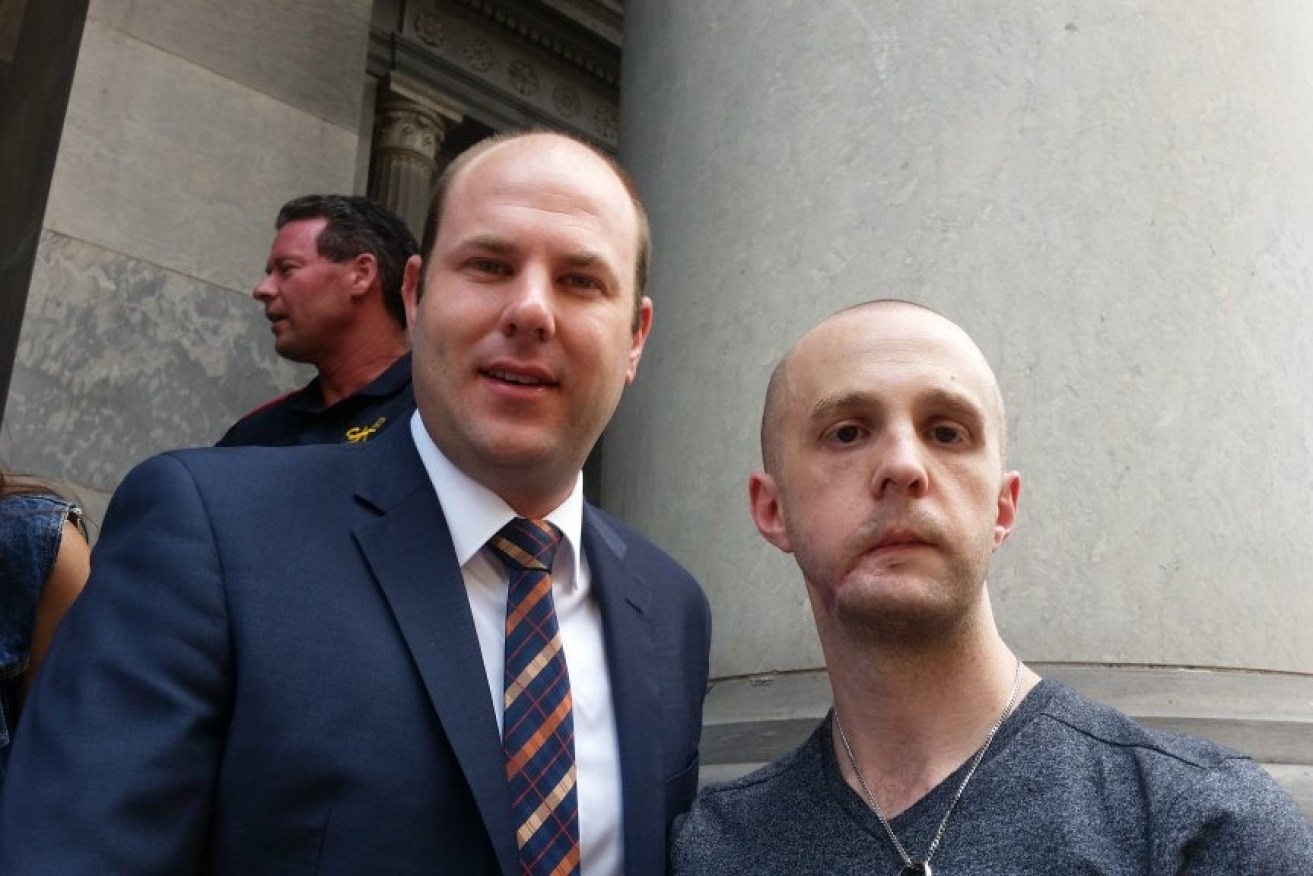Govt faces growing rebellion over workers compo
The State Government faces a growing backlash against its much-vaunted workers’ compensation laws in the wake of a police union campaign.


Liberal Sam Duluk at yesterday's rally with injured police officer Senior Constable Brett Gibbons, whose case has been used to push for amendments to compensation laws. Photo: Twitter.
The Police Association held a well-attended rally at Parliament yesterday to protest against the return to work provisions, which it argues will lead to officers severely injured on the job being kicked off benefits after two years.
In the Upper House last night, Family First MLC Rob Brokenshire was successful in having a Bill passed to exclude police from key provisions of the Return To Work scheme.
With the support of the Liberals and other crossbenchers, he successfully amended the Police Act to restore the rights of police injured on the job to ongoing medical costs and income support.
The Government’s new return to work scheme, which replaced the embattled WorkCover scheme in July, means that injured workers with a less than 30 per cent physical injury will have their workers’ compensation cut after two years.
While the Government seems certain to kill off Brokenshire’s Bill in the lower house, the police campaign is encouraging a wider rebellion against the Return To Work scheme.
The Greens’ Tammy Franks and Xenophon-aligned MLC John Darley say they will introduce a Bill to amend the return to work scheme for all injured workers.
The pair has the support of the powerful nurses union, which says the new scheme “abandons all workers”.
Critics of the scheme argue the 30 per cent rule is too restrictive, with Franks arguing it effectively only covers workers who have suffered “catastrophic” injuries resulting in quadriplegia and paraplegia.
Australian Nursing and Midwifery Federation state secretary Elizabeth Dabars said every worker in SA should be adequately protected if injured at work.
She released a number of case studies of nurses who, despite suffering ongoing medical problems which affect their ability to work, do not meet the 30 per cent “whole person injury” threshold under the Act.
While their injuries could be for life, the new scheme would offer no support after three years – the limit on medical expenses.
“In the case of a member who contracted Hepatitis B from a needlestick injury, major symptoms did not present themselves for nearly 30 years,” Dabars said. “Under the current Act, this nurse receives nothing.”
The Law Society is also pushing for wholesale changes, saying it’s unfair to give preferential treatment to police.
Tony Rossi, vice-president of the Law Society of SA, argues that all injured workers should have access to the same support restored to police through Brokenshire’s Bill.
“The SA Police Association is justifiably concerned about the lack of support for officers who are seriously injured on the job, but the Law Society believes all injured workers should have access to the same entitlements,” he said.
“Any proposal to give preferential treatment to one group undermines the fundamental principle of equality before the law. Our view is that the proposed amendments should apply generally, not just to the police, providing the scheme can afford to do so. It would be unjust for one injured worker to be given lifetime financial and medical support, and another worker with a comparable injury, who will suffer the same ongoing trauma, to miss out.”
He said the fact that the Government, through administrative changes, was able to wipe out a $1.3 billion unfunded liability before the new laws came into effect “suggests that a fairer workers compensation scheme can be implemented”.
The Government has touted its WorkCover changes as one of its great recent successes, with the new scheme wiping out the previous mountain of unfunded liabilities and saving businesses millions on premiums.
The Liberals voted in favour of the WorkCover changes, but have been vocal supporters of the police association campaign over the past week.
Industrial Relations Minister John Rau is holding the line, arguing that the injured officer at the centre of the police association (PASA) campaign is entitled to ongoing support.
“Everybody’s entitled to go to the media if they wish and run a campaign if they wish – I’m not in any way saying that PASA doesn’t have a right to do what they’re doing,” Rau told ABC radio today.
“No, I’m just suggesting if you want an outcome which is going to be beneficial, before you start a large media campaign the best thing to do would be to engage with the people you are trying to negotiate with, articulate exactly what the nature of the problem is so that you can sit down with them and try and find a solution.”





